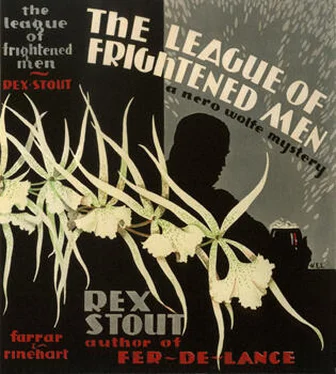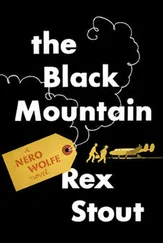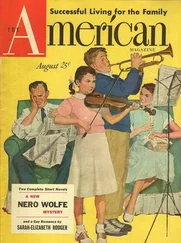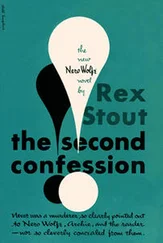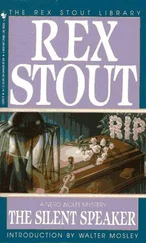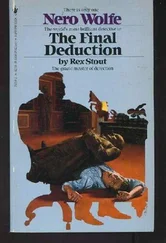There were mumblings. Ferdinand Bowen, the stockbroker, spoke up: “It seems to me Adler has commented for all of us. Drivel.”
Wolfe nodded. “I can understand that viewpoint. In fact, I suppose that under the circumstances it is inevitable. But let me expound my own viewpoint. My position is that I have met my obligations under the memorandum and that the payments are due.”
“My dear sir!” It was Nicholas Cabot. “Preposterous.”
“I think not. What I undertook to do was to remove your fear of Paul Chapin. That’s what it amounts to, with the facts we now have. Well: as for Andrew Hibbard, here he is. As for the deaths of Harrison and Dreyer, it should have been obvious to all of you, from the beginning, that Chapin had nothing to do with them. You had known him all his mature life. I had merely read his books; but I was aware last Monday evening, when you gentlemen were here, that Chapin could not possibly commit a premeditated murder, and not even an impromptu one unless suddenly demented. And you, Mr. Hibbard, a psychologist! Have you read Chapin’s books? Why are they so concerned with murder and the delight of it? Why does every page have its hymn to violence and the brute beauty of vehement action? Or, to change heroes, why did Nietzsche say, Thou goest to woman, forget not thy whip? Because he had not the temerity to touch a woman with the tip of a goose-feather. The truth is that Paul Chapin did murder Harrison and Dreyer, and all of you. He has murdered you, and will doubtless do so again, in his books. Let him, gentlemen, and go on breathing.
“No. Harrison and Dreyer and Hibbard are out of it. Consult the memorandum. There remains only the matter of the warnings. Chapin admits he sent them, and tells you how and why and where. The trilogy is done. There will be no sequels, and even if there were I should not suppose they would alarm you. If he should desire to use the same typewriter again he would have to come to this office for it, for it rests there on Mr. Goodwin’s desk.”
They all looked, and I moved out of the way so they could see it. Wolfe drank beer, and wiped his lips. He resumed:
“I know, of course, where the trouble lies. Paul Chapin is in the Tombs charged with the murder of Dr. Burton. If that had not happened, if Dr. Burton were here with us this evening alive and well, I have no doubt that all of you would acquiesce in my position. I have done the work I was engaged for. But as it is, you are confused; and what confuses you is this, that whereas you formerly had no security at all against Paul Chapin’s injurious designs, you now have more than you need. I offer you the security I undertook to get for you, but you are no longer interested in it because you already have something just as good: namely, that Chapin is going to be electrocuted and can no longer murder you even in books.—Mr. Cabot, I ask you as a lawyer, is that exposition of the situation correct? What do you think of it?”
“I think...” Cabot pursed his lips, and after a moment went on, “I think it is remarkably ingenious rubbish.”
Wolfe nodded. “I would expect you to. I take it, gentlemen, that Mr. Cabot’s opinion is approximately unanimous. Yes?—So it becomes necessary for me to introduce a new consideration. This: that Chapin did not kill Dr. Burton, that I can establish his innocence, and that if tried he will be acquitted.”
That started the second uproar. It began as a muttering of incredulity and astonishment; it was Leopold Elkus that put the noise in it. He jumped out of his chair and ran around Wolfe’s desk to get at him and grabbed his hand and began pumping it. He seemed to be excited; he was yelling at Wolfe something about justice and gratitude and how great and grand Wolfe was; I didn’t hear anything about megalomania. The others, busy with their own remarks, didn’t pay any attention to him. Mike Ayers, roaring with laughter, got up and went to the table for a drink. I got up too, thinking I might have to go and haul Elkus off of Wolfe, but he finally trotted back to the others, gesticulating and still talking. Wolfe lifted his hand at them:
“Gentlemen! If you please. I seem to have startled you. Similarly, I suppose, the police and the District Attorney will be startled, though they should not be. You of course expect me to support my statement with evidence, but if I do that I must ask you for more impartiality than I observe at the moment on most of your faces. You cannot be at the same time juridical and partisan, at least not with any pretense at competence.
“I offer these items. First, at a few minutes before seven on Saturday evening Paul Chapin answered the telephone in his apartment. It was Dr. Burton, who asked Chapin to come to see him immediately. A little later Chapin left to go to Ninetieth Street, arriving there at seven-thirty. But there was something wrong with that telephone call, namely, that Dr. Burton never made it. For that we have the word of his wife, who says that her husband telephoned no one around that time Saturday. It seems likely, therefore, that there was somewhere a third person who was taking upon himself the functions of fate.—I know, Mr. Adler. And I think I perceive, Mr. Bowen, that your face carries a similar expression. You would ask if I am gullible enough to believe Mr. Chapin. I am not gullible, but I believe him. He told his wife of the telephone call, and she told me; and there is the switchboard operator at the Chapin apartment house.
“Item two. Consider the details of what is supposed to have happened in the Burton foyer. Dr. Burton took the pistol from his desk and went to the foyer. Chapin, there waiting for him, took the pistol from him, shot him four times, turned out the light, threw the pistol on the floor and then got down on his hands and knees to look for it in the dark. What a picture! According to the story of Mrs. Burton and of the maid, Dr. Burton had been in the foyer not more than six seconds, possibly less, when the shots were fired. Burton was a good-sized man, and powerful. Chapin is small and is handicapped by a major deformity; he cannot even walk without support. Well... I am going to count six seconds for you. One... two... three... four... five... six. That was six seconds. In that space of time, or less, the crippled Chapin is supposed to have got the gun from Burton’s pocket, God knows how, shot him, dropped the gun, hobbled to the switch to turn off the light, and hobbled back to the table to fall to the floor. In your juridical capacity, gentlemen, what do you think of that?”
Leopold Elkus stood up. His black eyes were not floating back into his head now; he was using them for glaring. He let the bunch have the glare, right and left, saying loudly and clearly, “Anyone who ever believed that is no better than a cretin.” He looked at Wolfe. “I shall have apologies for you, sir, when this kindergarten is over.” He sat down.
“Thank you, Dr. Elkus.—Item three, for what conceivable reason did Chapin turn out the light? I shall not take your time by listing conjectures only to have you reject them as I have done. Make your own when you have leisure for it, if it amuses you. I only say, the actions even of a murderer should be in some degree explicable, and to believe that Chapin shot Burton and then hobbled to the wall to turn out the light is to believe nonsense. I doubt if any of you believe that. Do you?”
They looked at one another as if, having no opinions of their own, they would like to borrow one. Two or three shook their heads. George Pratt spoke up, “I’ll tell you what I believe, Wolfe. I believe we hired you to get Paul Chapin into trouble, not out of it.” Drummond giggled and Mike Ayers laughed. Nicholas Cabot demanded:
“What does Chapin have to say? Did he shoot or didn’t he? Did he turn out the light or didn’t he? What does he say happened during those six seconds?”
Читать дальше
